 What Stage of Sleep Do You Dream?
What Stage of Sleep Do You Dream?
A good amount of activity happens as you sleep, commonly people ask what stage of sleep do you dream? The answer is that you actually can dream in each of the stages of sleep. However, most dreaming occurs in the fifth stage, REM. There have been a couple different studies in which subjects were awakened during different stages to examine dream-related activity. Data published in Sleep and Hypnosis, a scientific journal, confirmed that dreams can occur in non-REM sleep. This information indicated that dreams may happen in each of the stages of sleep but they differ in dream recall capacity. Another study published in the Journal for Neuroscience also confirmed this after performing a similar experiment. In this one, 14 people participated in an experiment in which slow waves and spindles were the focus.
What Stage of Sleep Do You Dream with Hypnogogic Hallucinations?
Your definition of dream may influence your opinion on what stage of sleep do you dream. Sometimes people dream as early as stage one, though dreams at this time are much different than in stage five. These are referred to as hypnogogic hallucinations. The first stage of sleep is short, almost always less than ten minutes in duration. So, the dreaminess state of stage one is more like a sensation than a full-on dream. You may “feel” as though you can hear and see something that isn’t actually there. This stage acts as a threshold into sleep, a half in-half out stage. You can likely recall some occasions in which you personally felt hypnogogic hallucinations. It can produce a falling sensation from which many people will suddenly jar themselves awake.
What Stage of Sleep Do You Dream the Most?
Most dreaming occurs in the REM periods, or stage five in the stages of sleep. Numbering sleep stages, however, is really just a way to identify them. In reality, you can go through the non-REM stages a few times before reaching the fifth stage. Then, you may cycle through all of the stages of sleep a few times each night. As a protective measure, the human body enforces a sort of paralysis during REM sleep. This way, as you dream you are less likely to act out dreams or nightmares physically. Your brain wave activity increases during this time and you begin experiencing rapid eye movement. This is an indicator that a dream state has been initiated.
Is What Stage of Sleep You Dream Important?
The stage in which you dream is not as important as the actual act of dreaming. Even if you don’t recall dreams, you probably experience them. Dreaming is vital to your health. Multiple studies have concluded that dreams in the REM stage are somehow connected to trauma recovery. For example, this 2017 study tied a REM deficiency to susceptibility to trauma. This suggests that dreaming helps to work out issues or to develop a resiliency to future issues. Dreaming increases activity in several regions of the brain but also gives the part responsible for rational thinking a break. REM sleep occurs to perform a number of important tasks and dreaming is an important part of the package. This is partly why healthy sleep habits can make a big difference in memory retention and physical recovery.
REM Sleep Behavior Disorder and Lucid Dreams
A lucid dream state is one in which the sleeper can control some aspect of the dream. There is a great deal of scientific research on the subject. Some research points to a person’s ability to train themselves to become a lucid dreamer. One benefit of having this ability is the reduced likelihood of REM Sleep Behavior Disorder. According to investigation findings published by the Department of Clinical Psychology at Utrecht University, it can help nightmares. That’s because only about 1% of lucid dreamers suffer from lucid nightmares. A recent systematic study involving 634 participants from 60 countries came to that conclusion in 2018.
What Determines What Stage of Sleep Do you Dream?
As far as we can tell, what stage of sleep do you dream is not really affected by many personal factors. It may be possible that how quickly you cycle through the stages determines if you encounter dreaming in the earlier stages. There is an entire community of people who believe that polyphasic sleep can help achieve the benefits of REM faster. The idea behind this is to almost skip the earlier stages and go right to REM dreaming. However, most medical professionals will agree that this is not healthy. Each of the stages of sleep perform essential functions. Skipping any steps can create sleep debt which eventually catches up with you. It could result in chronic health conditions such as diabetes or in cognitive deficits in memory and coordination.
 What Stage of Sleep Do You Dream?
What Stage of Sleep Do You Dream?